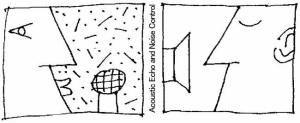|
Near End Listening Enhancement with Strict Loudspeaker Output Power Constraining
- Author(s)
-
- Bastian Sauert, (RWTH Aachen University)
- Gerald Enzner, (RWTH Aachen University)
- Peter Vary, (RWTH Aachen University)
- Topics
-
- Sound enhancement and sound separation
|
Get the paper in PDF format
Acrobat Reader
(version 5 minimum)
is necessary to read this document.
|
Abstract
The concept of near end listening enhancement has recently been proposed for improving the speech intelligibility of telecommunication equipment in the presence of ambient noise. Near end listening enhancement is a signal processing framework that acts on the received signal from the far end speaker to reduce the listening effort of the near end speaker. Since it is often not acceptable/possible to increase the emitted loudspeaker power, this paper investigates the opportunities of listening enhancement under the constraint that the processed loudspeaker signal power is strictly equal to the power of the received signal. We will compare two reasonable processing strategies: a previous one that aims at the amplification of speech at noisy frequencies and a new one which cuts down the speech power at noisy frequencies. The results show that a considerable improvement of speech intelligibility can be achieved by the second approach which can be understood by a simple model of human hearing.
|



